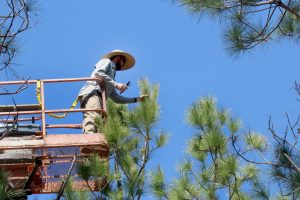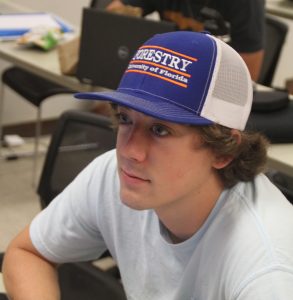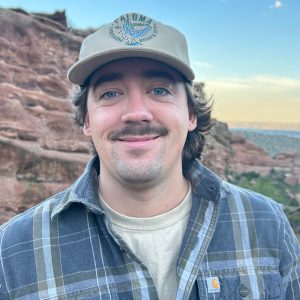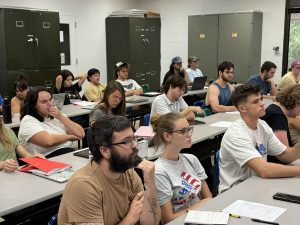By Pete Williams, editor Forest Landowner Magazine
It’s a Friday afternoon at the University of Florida in early September, and students have packed into Scott Sager’s two-hour “Professional Practice in Natural Resources” class.
Most college students would prefer to be kicking off their weekend, but the thirty-six undergrads crammed into a second-floor classroom in UF’s School of Forest, Fisheries, and Geomatics Sciences, appear locked in on Sager’s message.
Sager teaches forestry classes and manages the school’s Austin Cary Forest, UF’s 2,600-acre property just 15 minutes from campus that includes a teaching pavilion, education center, and a well-appointed 140-seat lakeside conference center. This one-credit class is as practical as it gets, focusing on preparing students to find their first job (resumes, applications, interviews), professional networking, and managing professional challenges such as co-workers, work/life balance, and conflicts of interest. It’s a class of mostly juniors, two-thirds of which are forestry majors, the rest in the broader natural resource major, split 50/50 male/female.
In the fall of 2018, I visited UF forestry students for the first time. I wanted to see what attracted students to the field and what direction they saw their careers heading. Now, six years later, in a more challenging job market, with Covid behind us and the United States more polarized than ever, I wanted to see if students were motivated by other forces and if they had different career goals. Did they understand the economics of our industry and the policy challenges private forest landowners face?
Sager spends the first hour of the class talking about resumes and job applications. Even in today’s digital world, the old-fashioned resume is still the calling card of a college student’s job search. Later, I’d ask how many students had LinkedIn profiles and would be surprised to see only half the hands in the room go up.
“The resume is for your first three jobs,” Sager tells the class. “By the time you get to your fourth job, you’ll know your new boss from a conference or meeting somewhere.”
On an overhead screen, Sager pulls up a job opening for a project manager for Wetlands Mitigations Banks. Among the job requirements are the operation of airboats and swamp buggies. It’s another reminder of why young people go into forestry and related fields.
“We’re always going to draw those students who are looking for outdoorsy careers,” says Red Baker, the dean of the school and an FLA board member. “You get a lot of students from the suburbs interested in saving the world, sustainability, and natural resource management. That hasn’t changed.”
Sager later pulled up an internship opportunity from Weyerhaeuser, which had sent representatives to the UF campus a week earlier to interview for summer 2025 openings. The gig Sager found includes “competitive compensation,” which is refreshing compared to other professions, such as journalism and sports management, which shamelessly offer only school credit. Interns in those fields go unpaid, and must foot their bills for summer housing and food for positions usually out of state.
When companies pay interns, they generally have well-defined duties and expectations, especially in specialized fields like forestry. That’s among the reasons, Sager says later in his office, UF has considered refusing to post unpaid internship offers, at least for the School of Forest, Fisheries, and Geomatics Sciences.
Back in the classroom, Sager goes over the upcoming calendar, including a pair of 5K running events, one at the Austin Cary Forest and the other in nearby Chiefland, Fla., on property belonging to Usher Land & Timber. Students can earn extra points on their final grade for completing one or both runs.
70 to 80 percent of students
get internships and real-life job
experience as undergrads
“I make it hard not to get an A in this class,” Sager says to a room full of blank expressions. He pauses. “C’mon, that was pretty funny.”
Perhaps the students were looking ahead to the weekend. Or maybe they were focused on the job and internship search. Unlike some majors that meander through college without getting internships or job experience and proceed to grad school for lack of job opportunities, forestry and natural resource students tend to be more focused.
Sager says that 70 to 80 percent of students get internships and real-life job experience as undergrads. Only a small percentage go to graduate school. “Most of them hit the ground in their careers running and never look back,” Sager says in his office later.
After an hour of lecturing, Sager yields the floor to me. I explain that FLA represents more than 2,000 private forest landowners who together own more than 50 million acres of forestland. I summarize FLA’s policy priorities, such as the Disaster Reforestation Act, and lament the ongoing challenges in timber markets. I also tell my personal story of inheriting forestland in Virginia following my father’s death in 2021.
I piggyback on the discussion of the 5K run in Chiefland, noting that two years ago, I featured Usher Land & Timber co-owner Lynetta Usher Griner, a two-time UF graduate, in this magazine. One of her foresters mentioned that with land values soaring in that part of Florida, it would not be long before much of the forestland was sliced into 20-acre ranchettes for weekend getaways for folks from Tampa and Orlando. I mention that if timber markets don’t improve, landowners across the country will face a similar dilemma.
That got the discussion rolling. As a class of mostly native Floridians, they had seen plenty of development and were driven by conservation and land management issues in a state where native Florida author Carl Hiaasen is fond of saying, “the leading industry is growth.”
Benjamin Barth, a junior from Sanford whose family has been in the Sunshine State for 100 years, noted that his grandfather worked for a drilling company and knew about the project that became the vast retirement community of The Villages 20 years before it happened. “You’ve got to preserve what’s left,” Barth says. “It’s growing so quickly, and we’re being more reactive than proactive to problems that arise from development.”
Several students seemed concerned with national park preservation, an issue that hit home recently in Florida when Governor Ron DeSantis proposed adding golf courses and pickleball courts to state parks. DeSantis backpedaled after the proposal drew major backlash.
One young woman mentioned that she became a forestry major because when her grandfather died, he left Mississippi forestland to her and her brother, who were both under 10. “My parents had no idea what to do with it, and we obviously didn’t. Even now, I’ve realized that most people don’t know much about forest management.”
Emma Hair, a junior from Kissimmee majoring in Natural Resource Conservation, nodded, noting a segment of the general public still thinks it’s wrong to cut a tree under any circumstances.
“With a lot of these issues, there’s not enough education and outreach to help them understand what we do,” she says. “It’s been better lately, but there’s such a misperception about what we do in terms of cutting trees down, management, and prescribed burning.”
With all of this policy discussion, I made a pitch for the Forest Policy Institute, the Forest Landowners Foundation program that brings forestry students to Washington, D.C., each spring to attend FLA’s winter board meeting and accompany FLA members to Capitol Hill to meet with Members of Congress. Baker, the forestry dean and FLA board member, helped launch the program and has accompanied UF students to Washington in each of the four years it’s taken place in-person since 2019. That involvement helped earn the University of Florida FLA’s Partner Recognition Award at the National Conference of Private Forest Landowners in June in Colorado.
Several students hung around after class asking for more information about the Forest Policy Institute. Others just wanted to share their stories.
Phillip Choisnet, a junior from Jacksonville majoring in Forest Resource Conservation, was one of the older students in the class at 35. He had served in the Navy and done a stint as a wildland firefighter. He hoped to become a state forester.
Kellie Parsons, a junior from Pensacola majoring in Forest Resource Conservation, said she grew up hunting on Alabama forestland and chose her college program as a way to contribute. “It’s kind of hard as a woman to earn your keep at a hunting camp,” she says. “I wanted to earn my way rather than just being a guest. Now I have this knowledge, and they’re calling me for input.”
Where are they now?
In October 2018, Forest Landowner magazine editor Pete Williams visited the University of Florida and spoke with five forestry students for an article that appeared early in 2019. Here’s where those students are now:
Daisy Andrews
Then: a junior majoring in Forest Resources & Conservation
Now: After holding several conservation and data analytics positions, now in last year of law school at the University of Vermont, focusing on environmental law and policy.
David Dietz
Then: A senior majoring in Natural Resource Conservation
Now: An older student (48) in 2018, Dietz called himself a “cubicle farm escapee downsized from an IT job.” He’s since worked as an analyst in mergers and acquisitions, according to his LinkedIn profile.
Kari Knutson
Then: a senior majoring in Forest Resources Management
Now: Knutson had worked for Walt Disney World for 11 years before returning to school. Now approved to teach middle grades science, according to her LinkedIn profile, she hopes “to use my creative background and scientific education to inspire young people to explore the wonders of the world around them.”

Aaron Smith
Then: a senior majoring in Forestry and Natural Resource Conservation
Now: After several years as a consulting forester, Smith returned to the University of Florida, where he’s a genetics technician and forester at the school’s Austin Cary Forest.
Chad Ward
Then: a senior majoring in Forest Resources & Conservation
Now: Ward worked as a forester for Rayonier and West Fraser before launching Union Timber & Land LLC in August out of his native Lake Butler, Fla.


 0
0

